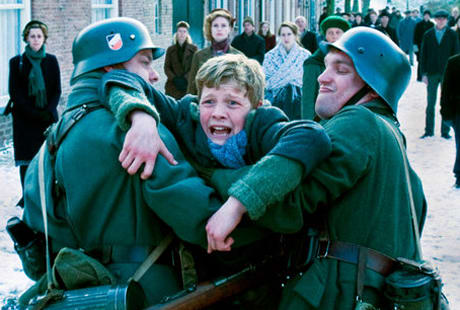Speaking in terms of recent European Holocaust movies, Martin Koolhoven's superbly crafted Winter in Wartime is like a more sober and assured Boy in Striped Pyjamas, easily surpassing the meandering Max Manus, even if it never reaches the dramatic heights and complexity of Flame & Citron. It doesn't challenge dominant assertions, staying firmly on the "right" side of things, identification-wise, but also integrates mixed loyalties, avoiding flat-out caricature, mixing up historical expectations enough to keep things vital, if safe.
Set in the titular season, with snow-covered streets and fields, exploited visually by lush, expansive photography, this practical coming-of-age tale sticks to the perspective of 14-year-old Michiel (Martijn Lakemeier) in 1945 Nazi-occupied Holland. Catching glimpses of soldiers harassing his neighbours and having quiet meetings with his father the mayor, his attitude towards the war is one of naïve petulance. He's merely annoyed by the inconveniences associated with the conflict and lacks the life experience to contextualize or extrapolate.
Warned by his uncle, Ben (Yorick van Wageningen), not to get involved in the war, he inevitably does just that, innocently playing messenger for a schoolyard friend, coming in contact with a wounded British soldier hiding from the Germans as a result.
Unsurprisingly, this spells trouble, but since Koolhoven maintains such a specific tone and perspective, leaving Michiel somewhat in the dark, tensions stem specifically from audience knowledge and anticipation of what our young protagonist can't foresee. It forces the viewer to become a passive protector while enjoying the generally propulsive nature of a movie that delivers intense moments, thrilling chase scenes and even the occasional twist.
This confidence in storytelling compensates for the occasional strained grasp on melodrama, such as a slow motion run through town to an impending execution, injecting entertainment and investment into a morally straightforward tale.
Had the divisions between black and white been less rigid, as a sequence with a German soldier saving the life of a drowning, hypothermic Michiel suggests, this frequently riveting Dutch import could have gone from really good to exceptional.
(Mongrel Media)Set in the titular season, with snow-covered streets and fields, exploited visually by lush, expansive photography, this practical coming-of-age tale sticks to the perspective of 14-year-old Michiel (Martijn Lakemeier) in 1945 Nazi-occupied Holland. Catching glimpses of soldiers harassing his neighbours and having quiet meetings with his father the mayor, his attitude towards the war is one of naïve petulance. He's merely annoyed by the inconveniences associated with the conflict and lacks the life experience to contextualize or extrapolate.
Warned by his uncle, Ben (Yorick van Wageningen), not to get involved in the war, he inevitably does just that, innocently playing messenger for a schoolyard friend, coming in contact with a wounded British soldier hiding from the Germans as a result.
Unsurprisingly, this spells trouble, but since Koolhoven maintains such a specific tone and perspective, leaving Michiel somewhat in the dark, tensions stem specifically from audience knowledge and anticipation of what our young protagonist can't foresee. It forces the viewer to become a passive protector while enjoying the generally propulsive nature of a movie that delivers intense moments, thrilling chase scenes and even the occasional twist.
This confidence in storytelling compensates for the occasional strained grasp on melodrama, such as a slow motion run through town to an impending execution, injecting entertainment and investment into a morally straightforward tale.
Had the divisions between black and white been less rigid, as a sequence with a German soldier saving the life of a drowning, hypothermic Michiel suggests, this frequently riveting Dutch import could have gone from really good to exceptional.
